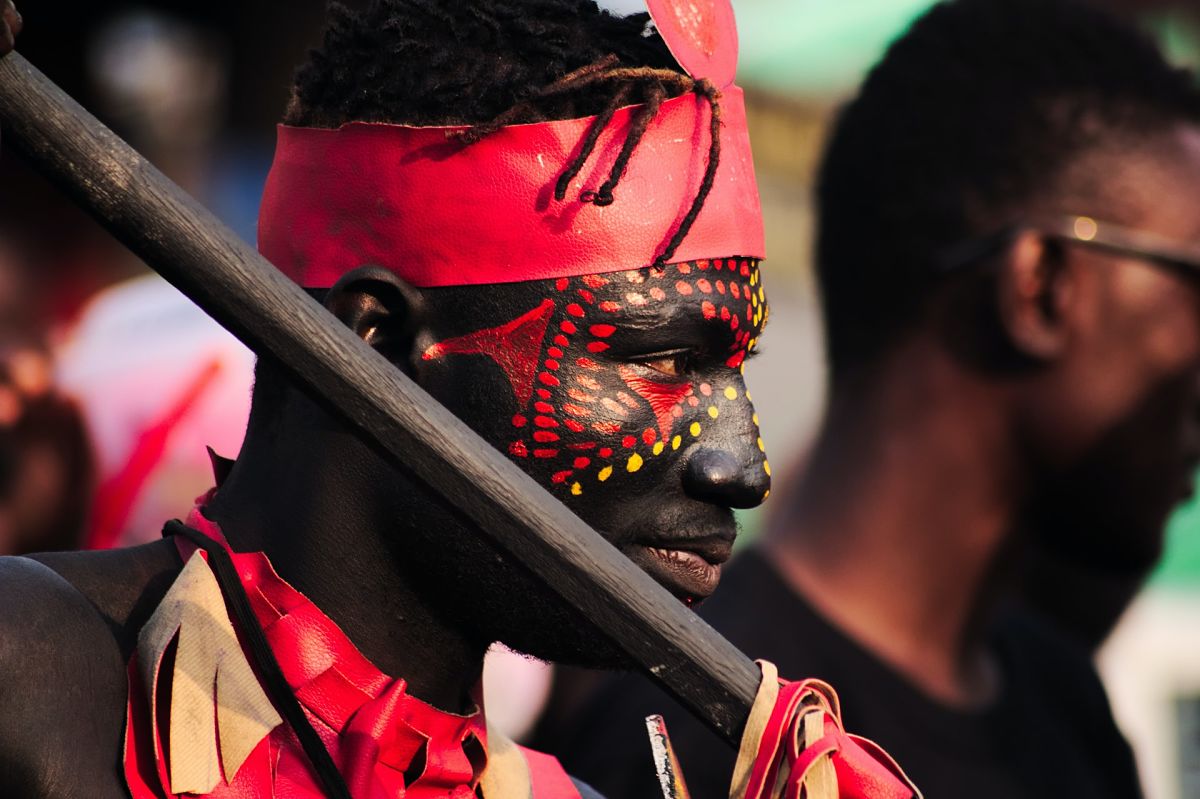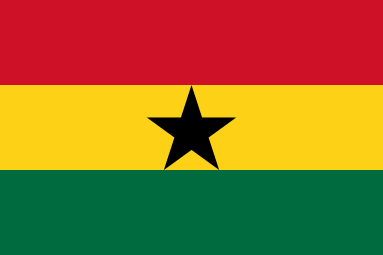Ghana - Culture, Etiquette and Business Practices
Welcome to our guide to Ghana!
Perfect for anyone researching Ghanaian society, people and business culture.
What will you Learn About Ghana?
You will gain an understanding of a number of key areas including:
- Language
- Religion and beliefs
- Culture and society
- Social etiquette and customs
- Business culture and practices

A Ghanaian man in traditional costume for the Chale Wote Festival. Photo by Enoch Appiah Jr. on Unsplash
Facts and Statistics
Location: Western Africa, bordering the Gulf of Guinea, between Cote d'Ivoire and Togo
Capital: Accra
Climate: tropical along coast, becoming cooler inland at higher elevations; tropical in Amazonian jungle lowlands
Population: 30+ million (2019 est.)
Ethnic Make-up: Akan 45.3%, Mole-Dagbon 15.2%, Ewe 11.7%, Ga-Dangme 7.3%, Guan 4%, Gurma 3.6%, Grusi 2.6%, Mande-Busanga 1%, other tribes 1.4%, other 7.8% (2000 census)
Religions: Christian 68.8% (Pentecostal/Charismatic 24.1%, Protestant 18.6%, Catholic 15.1%, other 11%), Muslim 15.9%, traditional 8.5%, other 0.7%, none 6.1% (2000 census)
Government: constitutional democracy
Language in Ghana
Different sources give different figures for the number of languages of Ghana. This is because of different classifications of varieties as either languages or dialects.
As with many ex-colonies in Africa, the official language of Ghana is the colonial language, English. Nine languages have the status of government-sponsored languages: Akan, Dagaare/Wale, Dagbane, Dangme, Ewe, Ga, Gonja, Kasem, Nzema. However, two dialects of Akan, Twi and Fante, although not government-sponsored, are also widely-spoken in Ghana.
Hausa is widely used as a lingua franca by Muslims in Ghana.
Ghanaian Society and Culture
The People
There are over 100 ethnic groups living in Ghana. The largest are Akan, Moshi-Dagbani, Ewe, and Ga. The Ashanti tribe of the Akan are the largest tribe and one of the few societies in West Africa where lineage is traced through the mother and maternal ancestors. Once famous for the luxury and wealth of their rulers, they are now more well known for their craft-work such as hand-carved stools, fertility dolls, and ‘kente’ cloth. Kente cloth is made cotton and is woven in bright, narrow strips with complex patterns.
The Family
Family is a very strong bond in Ghana and is the primary source of identity, loyalty and responsibility. Family obligations take precedence over pretty much everything else in life. Individuals achieve recognition and social standing through their extended family.
An interesting cultural variation among the Akan, or Ashanti and Fanti people, is that affiliation within the clan is through women. Mothers have a higher status as in their point of view people get their blood from mothers.
It is important for Ghanaians to maintain dignity, honour, and a good reputation. The entire family shares any loss of honour, which makes the culture a collective one. In order to protect this sense of face there is a need to maintain a sense of harmony; people will act with decorum at all times to ensure they do not cause anyone embarrassment.
Hierarchy
Ghanaian society is hierarchical. People are respected because of their age, experience, wealth and/or position. Older people are viewed as wise and are granted respect. In a group one can always see preferential treatment for the eldest member present. With respect comes responsibility and people expect the most senior person to make decisions that are in the best interest of the group.

Enjoying some downtime at the beach in Kokrobite. Photo by Ransford Quaye on Unsplash
Etiquette and Manners in Ghana
Meeting Etiquette
- Traditional or native greetings vary among the various ethnic groups.
- With foreigners the most common greeting is the handshake with a smile.
- When shaking hands between themselves Ghanaians will hold the right hand in the normal manner but will then twist and click each other’s middle finger.
- Unless you are experienced it is best to stick to a normal handshake!
- Christians will generally shake hands between the sexes; practising Muslims often will not shake hands with people of the opposite sex.
- Address Ghanaians by their academic, professional, or honorific title and their surname.
- As a sign of respect, males over the age of 30 may be addressed as "pah-pah" while women of the same age may be called "mah-mee". People over the age of 50 may be referred to as "nah-nah".
Gift Giving Etiquette
- Gifts need not be expensive; the thought is more important than the value.
- If invited to dinner at a Ghanaian’s home, you are not expected to bring a gift.
- However, a gift for the children is always a nice touch as it shows a concern for family.
- Gifts should be given using the right hand only or both hands. Never use the left hand.
- Gifts should be wrapped, although there are no cultural taboos concerning paper colour.
- Gifts are not always opened when received.
GHANAIANS ARE NOT FAMED FOR THEIR TIME KEEPING!
IN FACT, IT'S SO BAD THAT EVEN GHANAINS CALL IT "GMT" - GHANA MAYBE TIME!
Dining Etiquette
- Ghanaians enjoy entertaining in their homes and you should accept any invitation as a sign of friendship.
- Dress well; Ghanaians place a lot of emphasis on how people dress. You may need to remove your shoes.
- Greet elders of heads of family first.
- Ghanaians table manners are relatively formal.
- Wait to be told where to sit.
- A washing basin will be brought out before the meal is served; use it to wash your hands.
- Food is generally served from a communal bowl.
- Do not begin eating until the eldest male does.
- Eat from the section of the bowl that is in front of you. Never reach across the bowl to get something from the other side.
- If you do not want to eat with your hands then ask for utensils.
- If you use your hands then scoop the food with the thumb and first two fingers of the right hand. Do not use your left hand.
Working out of an internet cafe in Kumasi. Photo by Kojo Kwarteng on Unsplash
Business Etiquette and Practices in Ghana
If you're looking for expert help and advice on how to work effectively with Ghanaians, then this is what we do!
Click here to learn more about our customized cultural training.
Meeting and Greeting
- Handshakes are the most common means of greeting.
- It’s generally common to wait for a woman to extend her hand first.
- Take time to inquire about people’s health, family and jobs. To rush a greeting is extremely rude.
- Maintain eye contact during the greeting.
- Titles are important. Use the honorific title plus any academic or professional title and the surname.
- Wait until invited before moving to a first-name basis. The younger generation will tend to do so rapidly.
- Business cards are exchanged without formal ritual.
- Present and receive business cards with two hands or the right hand, never with the left.
Communication Style
Ghanaians are more indirect communicators. This means they take care not to relay information in any way that could cause issues, whether that be giving someone bad news, turning down an invitation, refusing a request or any other such matter. Ghanaians always want to protect their own and others’ face as well as maintain harmonious relationships.
As a result they tend to use proverbs, wise sayings, analogies readily. This allows ideas or messages to be convened in a manner that does not seem so blatant. In fact people who are viewed as wise frequently speak in proverbs.
Silence is a common means of communication. If someone is uncomfortable with a question or do not think the asker will appreciate response, they will say nothing rather than make the other person uncomfortable.
VISITING GHANA FOR PROFESSIONAL REASONS?
THEN YOU NEED TO BRUSH UP ON YOUR ETIQUETTE TO ENSURE YOU MAKE A GOOD IMPRESSION!
CLICK HERE FOR MORE BUSINESS ETIQUETTE TIPS
Business Meetings
- Initial meetings are really all about finding out about one another and if a personality fit allows for future, more business specific meetings. One should therefore expect to spend quite a good deal of time in relationship and rapport building. Do not be surprised is business is not really discussed much at all.
- First meetings may also tend to be a little more stiff and formal although once a rapport has been built this will soon dissipate. It is important to maintain a polite and somewhat reserved demeanor.
- Hierarchy is respected so the most senior person is greeted first. He/she may be the spokesperson for the group or may deputise key stakeholders to speak.
- Ghanaians have a keen sense of humour and enjoy telling jokes. However until you have understood their sense of humour it is best to refrain from telling jokes yourself. If a
- Ghanaian teases you take it good-naturedly. For the most part, this shows they are becoming more relaxed with you.
Management
- Read our guide to Ghanaian Management Culture for specific information on this topic.
THANKS FOR READING OUR GUIDE TO GHANA! WE HOPE YOU FOUND IT USEFUL.

 +44 0330 027 0207 or +1 (818) 532-6908
+44 0330 027 0207 or +1 (818) 532-6908



